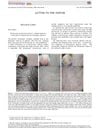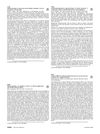 April 2022 in “Journal of biotechnology and strategic health research”
April 2022 in “Journal of biotechnology and strategic health research” COVID-19 infection may cause hair loss a few months after recovery.
 January 2022 in “International Journal of Medicine in Developing Countries”
January 2022 in “International Journal of Medicine in Developing Countries” Many patients with hair loss had low iron and vitamin D levels, but thyroid issues were not common.
 July 2021 in “Australasian Journal of Dermatology”
July 2021 in “Australasian Journal of Dermatology” The trichoscopy-assisted hair pull test is useful for diagnosing different types of hair loss.
February 2021 in “INTERNATIONAL JOURNAL OF SCIENTIFIC RESEARCH” Low zinc and copper levels may indicate Telogen Effluvium.
January 2021 in “Hair therapy & transplantation” Telogen effluvium causes temporary hair loss, but new hair still grows.
 December 2020 in “International Journal of Research in Dermatology”
December 2020 in “International Journal of Research in Dermatology” Many dermatologists in India find serum peptide formulations effective for treating hair loss.
 December 2020 in “Journal of Drugs in Dermatology”
December 2020 in “Journal of Drugs in Dermatology” The document concludes that more research is needed to confirm if blood tests for things like iron and vitamin D are helpful for hair loss from Telogen effluvium.
 September 2020 in “Osmangazi tıp dergisi”
September 2020 in “Osmangazi tıp dergisi” Thyroid dysfunction, vitamin D and B12 deficiencies, and iron deficiency may be linked to hair loss condition Telogen Effluvium.
 September 2020 in “University of Thi-Qar Journal of Medicine”
September 2020 in “University of Thi-Qar Journal of Medicine” Low iron and vitamin D3 levels might be major causes of hair loss in Iraqi women.
 August 2019 in “DOAJ (DOAJ: Directory of Open Access Journals)”
August 2019 in “DOAJ (DOAJ: Directory of Open Access Journals)” Telogen effluvium is a common, distressing condition causing excessive hair shedding and has significant psychological effects on patients.
 January 2019 in “Indian Dermatology Online Journal”
January 2019 in “Indian Dermatology Online Journal” Stress, hypothyroidism, drug intake, and anemia are important factors in women's diffuse hair loss.
 August 2018 in “Journal of The American Academy of Dermatology”
August 2018 in “Journal of The American Academy of Dermatology” People with telogen effluvium and scalp discomfort might have low vitamin B12 and could benefit from B12 supplements.
 January 2018 in “The Egyptian Family Medicine Journal”
January 2018 in “The Egyptian Family Medicine Journal” Iron deficiency anemia is significantly linked to hair loss in childbearing women, and taking iron improves the condition.
 January 2018 in “Journal of Clinical Dermatology”
January 2018 in “Journal of Clinical Dermatology” Women with Telogen Effluvium have lower levels of Zinc and Iron in their hair.
 January 2017 in “Turkiye Klinikleri Journal of Dermatology”
January 2017 in “Turkiye Klinikleri Journal of Dermatology” Low vitamin D levels, not ferritin levels, were found in patients with hair loss condition telogen effluvium.
 December 2016 in “The Journal of Sexual Medicine”
December 2016 in “The Journal of Sexual Medicine” Short-acting testosterone injections in a clinic are a preferred treatment for low testosterone because they work well, are convenient, and patients stick with the treatment.
 April 2016 in “Journal of The American Academy of Dermatology”
April 2016 in “Journal of The American Academy of Dermatology” Different treatments are effective for hair loss conditions, but results vary by individual factors.
 April 2016 in “Journal of The American Academy of Dermatology”
April 2016 in “Journal of The American Academy of Dermatology” A vitamin and mineral supplement significantly reduced hair shedding in Brazilian women with telogen effluvium.

The document concludes that severe trauma can cause temporary hair loss, known as Telogen Effluvium, which usually resolves without treatment.
 March 2014 in “Journal of The American Academy of Dermatology”
March 2014 in “Journal of The American Academy of Dermatology” TNF-a may not be as involved in certain types of hair loss as previously thought.
Serum ferritin levels do not cause hair loss in women with telogen effluvium.
 January 2008 in “Journal of Clinical Dermatology”
January 2008 in “Journal of Clinical Dermatology” Integrin alpha-6 and p63 proteins may play a role in hair loss and are important for hair growth and maintenance.
 October 2005 in “CRC Press eBooks”
October 2005 in “CRC Press eBooks” Telogen effluvium is a condition where hair falls out due to various factors like illness, stress, or nutrient deficiency.
 September 2003 in “Clinics in Family Practice”
September 2003 in “Clinics in Family Practice” Different hair diseases affect people during childbearing years, with treatments ranging from medication to psychological support.
 November 2001 in “CRC Press eBooks”
November 2001 in “CRC Press eBooks” Hair loss from telogen effluvium happens when a disturbance or imbalance causes hair to fall out prematurely.
April 2023 in “Dohuk medical journal” Trichoscopy effectively differentiates Androgenetic Alopecia from Telogen Effluvium.
 March 2023 in “Human Pathology”
March 2023 in “Human Pathology” Hair follicle counts and ratios are helpful in diagnosing hair loss types, but should be used with other specific features for accurate diagnosis.
Dermoscopic features can help distinguish female androgenetic alopecia from telogen effluvium and healthy controls.
December 2021 in “International Journal of Research in Dermatology” Early diagnosis and personalized treatment are crucial for managing hair loss in India.
May 2020 in “Archives of Medical Science” Men with androgenetic alopecia have lower levels of certain proteins and more cell damage.























